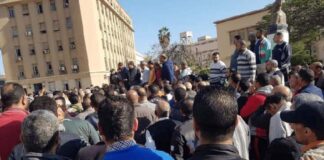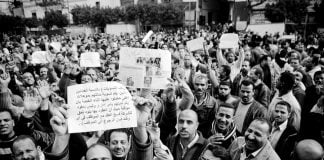Hosni Mubarak’s fate was sealed by the entrance of the Egyptian working class into the struggle against the regime.
Strikes by property tax collectors and Mahalla textile workers in 2006-2008 ignited the longest strike wave seen in Egypt since 1946. Every single day for the past three years, there were strikes in at least one factory in Cairo. Many raised political demands about regime change alongside demands for higher wages. Their courage was crucial in laying the foundations for the eruption on January 25.
An Egyptian Federation of Independent Unions was established on the first day of the protests, beginning with the four independent trade unions built out of the 2006-2008 strikes.
But it was only on the Wednesday before Mubarak fell that a serious workers movement developed, with at least 20,000 factory workers on strike. Over the next few days postal workers walked out, state rail workers blocked the railroads across the country, university professors and doctors struck and marched on Tahrir square and the State Central Census Bureau was brought to a halt. There were also strikes by bus drivers, in chemicals, steel, cement, textiles and petrochemicals, telecommunications and insurance industries.
There are reports in a handful of factories of workers expelling their bosses and taking control of the workplace. Demands issued by one group of iron and steel workers included more workers’ control over production: “formation of a workers’ monitoring committee in all workplaces, monitoring production, prices, distribution and wages.”
Just like in Tunisia, workers’ action finished off the regime by paralysing it economically. In the days after Mubarak’s removal, strikes were still everywhere—thousands of state employees, from ambulance drivers to police to bank workers, protested for better pay. Thousands of workers from oil and gas industries were also on strike. As well as demanding higher salaries and reinstatement of sacked workers, they called for an independent union, the sacking of the corrupt oil minister and, significantly, a halt to gas exports to Israel.
The army wants to choke off the workers’ action—because they themselves run factories and agricultural industries. They were threatening an all-out ban on strikes as Solidarity went to press. But Egyptian socialist Hossam El-Hamalawy explained that workers, “have been emboldened by Mubarak’s overthrow, and cannot go back to their children and tell them the army has promised to bring them food and their rights in I don’t know how many months.”
Strikes in Egypt will be crucial in the coming weeks. As Hossam put it: “As the revolution proceeds an inevitable class polarisation is to happen… We shouldn’t stop here… We hold the keys to the liberation of the entire region, not just Egypt. Onwards with a permanent revolution that will empower the people of this country with direct democracy from below.”
By Amy Thomas





